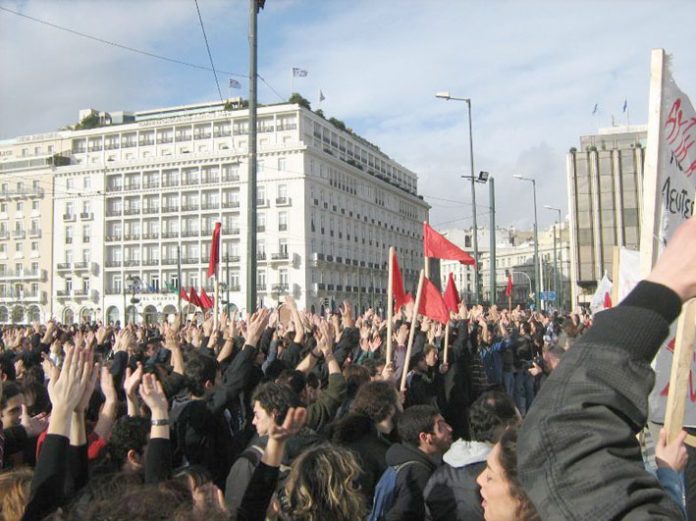Over 8,000 tractors and tens of thousands of small farmers have occupied sections of motorways and national roads in central and northern Greece, setting up blockades and halting all traffic except for emergency vehicles.
Blockades have also been set up at all border crossings between Greece and Bulgaria and Turkey.
Last Thursday, representatives from small farmers’ local co-ordinating committees met in central Greece and set up a National Co-Ordinating Committee which met last Saturday night and rejected the government’s offer of a 500 million euros ‘aid package’ in benefits and low interest bank loans.
According to reports from the various co-ordinating committees, more and more small farmers were bringing their tractors and machinery to the blockades last weekend.
The world economic collapse is hitting Greek farmers hard.
Cotton, cereals and olive oil prices have plummeted worldwide.
The European Union’s Common Agricultural Policy, which in the past handed out considerable cash benefits to the Greek farmers, in the last few years has turned against them.
Most of the small farmers, especially those of the younger generations, who followed the Greek state advice to participate in various European Union ‘programmes’, now find themselves in a desperate financial situation.
These conditions have forced Greek small farmers to stage their widespread mobilisations, by far the biggest of the decade.
The Greek youths’ and students’ uprising has been hugely influential to the current small farmers’ struggle.
Last Friday, Greek students in Athens and Salonica organised mass demonstrations and rallies against the right-wing government in accordance with their decision for weekly marches.
In Athens over 3,000 students marched through the city centre to the Vouli (Greek parliament) building.
In front of the march the huge banner of the Athens Polytechnic proclaimed their demands: ‘no to the dialogue with the government’; ‘scrap the EU’s directives’; ‘scrap the reactionary education law’; ‘hands off the academic asylum’.
Both the government and the PASOK social-democrats have called on university authorities to allow police to enter universities’ grounds and buildings which, according to the Greek Prime Minister Kostas Karamanlis, have become the bases of insurrectionists.
Since 1974, with the overthrow of the military junta that ruled Greece, police and security forces are not allowed to enter universities.
Most of the students’ banners on the march called for the overthrow of the government.
Once again, the KKE (Greek Communist Party) refused to support the students’ struggle and did not participate in the mobilisations.
Last Thursday night the KKE’s General Secretary, in an indoor rally, repeated her claim that the students’ movement and struggles are ‘degenerate’.
When the march reached the Vouli building, students were joined by large contingents of school teachers and university lecturers.
Armed police riot units blocked their way to the building but this time there was no attack on the students.
Inside the Vouli parliamentary deputies were debating education.
Students kept on chanting ‘down with the government of murderers’ and ‘cops are not the children of workers – they are the dogs of capitalists’.
This was a direct answer to the claims of both the General Secretary of the Greek Communist Party and of the parliamentary leader of the Coalition of the Radical Left who described the police as ‘children of the working class’.
Only a few university departments are now under students’ occupation; last week right-wing, social-democrat and Communist Youth students made up a majority vote against occupations.
But the growing militancy of the Greek working class and youth was clearly expressed in last Thursday’s demonstrations in Athens and Salonica in support of Konstantina Koulieva, a cleaner in the Metro system who was attacked last month by a group of uniformed men. She is still in hospital in a serious condition.
Koulieva, a Bulgarian, is the secretary of the Athens-Piraeus Cleaners Trade Union and has been fighting for workers’ rights and against victimisations.
She has been employed by a private contractor along with hundreds of other migrant workers.
Some 5,000 workers and youth marched from the Athens city centre to the Ministry for Employment building demanding that those responsible for the attack on Koulieva are found and punished.
The demonstration was organised by over 50 trade union branches and supported by several immigrant workers’ organisations.
But the GSEE (Greek TUC) refused to support the march, along with the KKE (Greek Communist Party).
